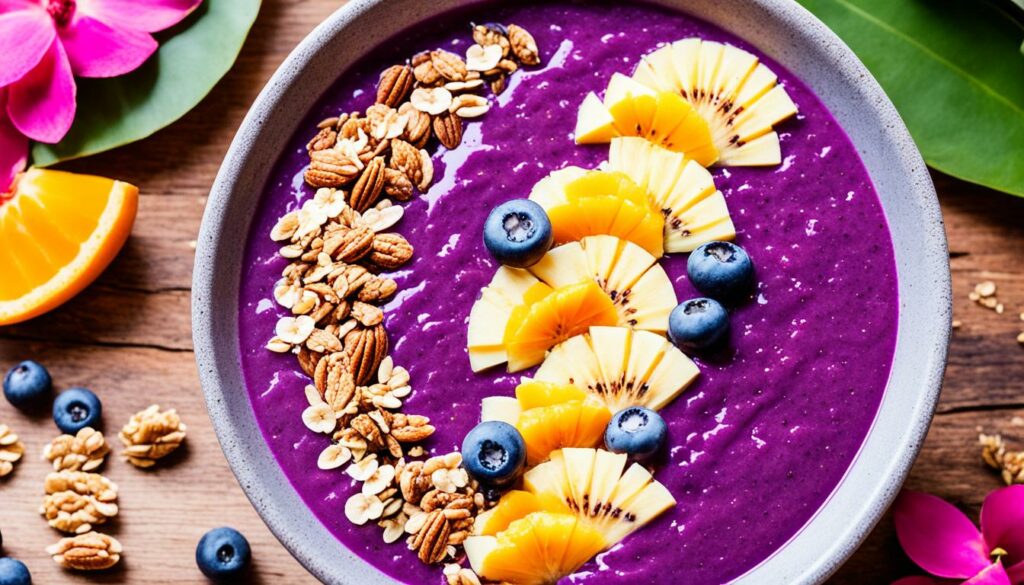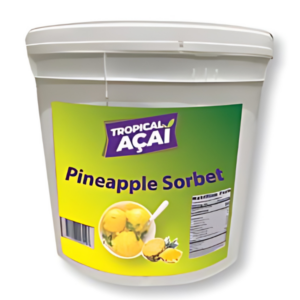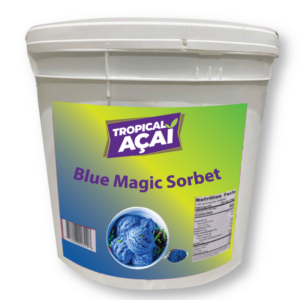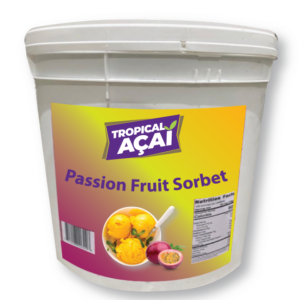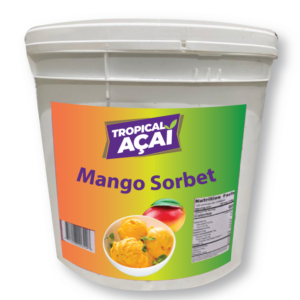Are you following a gluten-free diet and wondering if Acai is safe to consume? We’ve got all the answers you need to make an informed decision. Acai is a popular superfood known for its numerous health benefits, but is it genuinely gluten-free? Let’s dive into the details and find out how Acai can fit into your gluten-free lifestyle.
Acai is naturally gluten-free as it is not derived from grains containing gluten, such as wheat, barley, or rye. This makes Acai berries and Acai products, such as Acai juices and frozen Acai puree, suitable for those following a gluten-free diet. The Acai berry itself is free from gluten, but it’s essential to be cautious when mixing Acai with other ingredients to avoid potential gluten cross-contamination. Acai is not only gluten-free but also vegan, sustainable, bursting with nutrients, and certified organic. It can be enjoyed in various forms, such as smoothies, bowls, and supplements.
Key Takeaways:
- Acai is naturally gluten-free and safe for individuals following a gluten-free diet.
- Acai is gluten-free, vegan, sustainable, and certified organic.
- Acai is packed with nutrients and can provide various health benefits.
- When mixing Acai with other ingredients, check for potential gluten cross-contamination.
- There are numerous delicious gluten-free Acai recipes and treats to enjoy.
Understanding Gluten and Celiac Disease
Gluten is a protein commonly found in wheat, barley, and rye. It serves as a bonding agent in various food products. Celiac disease is an autoimmune disorder that affects approximately 1% of the population. It results in a severe gluten intolerance, leading to intestinal damage. On the other hand, gluten sensitivity is a less severe form of gluten intolerance that may cause negative reactions without resulting in intestinal damage.
Following a gluten-free diet is crucial for individuals with Celiac disease or gluten sensitivity. Gluten-free foods contain less than 20 parts per million of gluten, as declared by the FDA. Fortunately, Acai, a superfood derived from Acai berries, is naturally gluten-free, making it a safe and suitable option for those with Celiac disease or gluten sensitivity.
It’s essential to understand the impact of gluten on individuals with Celiac disease and gluten sensitivity. Let’s explore the details further:
The Role of Gluten in Food
Gluten is a bonding agent in foods, providing elasticity and enabling them to maintain shape. It can be found in many products, including bread, pasta, cereals, baked goods, and processed foods. However, gluten is not limited to these obvious sources and can also be hidden in unexpected places such as sauces, condiments, and even beauty and personal care products.
Celiac Disease and Intestinal Damage
Celiac disease is an autoimmune disorder that primarily affects the small intestine. When individuals with Celiac disease consume gluten, their immune system reacts by attacking the lining of the small intestine. This immune response results in inflammation and damage to the villi, the tiny finger-like projections responsible for nutrient absorption.
If not appropriately managed, Celiac disease can lead to various complications and long-term health issues. It is essential for individuals with Celiac disease to strictly adhere to a gluten-free diet to prevent further damage to their intestines.
Gluten Sensitivity and Negative Reactions
Gluten sensitivity is when individuals experience adverse reactions after consuming gluten-containing foods. These reactions can manifest as digestive issues, headaches, fatigue, joint pain, skin problems, etc. While gluten sensitivity may cause significant discomfort, it does not result in intestinal damage like Celiac disease.
Individuals with gluten sensitivity also need to follow a gluten-free diet to alleviate their symptoms and maintain their overall well-being.
The Importance of a Gluten-Free Diet
For individuals with Celiac disease or gluten sensitivity, a gluten-free diet is vital to manage their condition effectively. Avoiding gluten-containing foods allows the small intestine to heal and alleviates symptoms associated with gluten intolerance.
Gluten-free foods are specifically processed or manufactured to contain less than 20 parts per million of gluten. This threshold ensures that the product is safe for consumption by individuals with Celiac disease or gluten sensitivity.
Fortunately, Acai is a naturally gluten-free food that can be enjoyed without worry. Its gluten-free nature makes it an ideal choice for individuals following a gluten-free diet.
The following section will explore incorporating Acai into a gluten-free diet, including various delicious recipes and treats.
Incorporating Acai into a Gluten-Free Diet
When following a gluten-free diet, finding delicious and nutritious alternatives to satisfy your cravings is essential. Fortunately, Acai can be easily incorporated into a gluten-free diet, allowing you to enjoy its many benefits without compromising your dietary restrictions.
One popular way to incorporate Acai into a gluten-free diet is by making Acai bowls. These refreshing bowls are visually appealing and can be customized to suit your taste preferences. To ensure your Acai bowl remains gluten-free, opt for gluten-free granola as a topping or substitute it with other alternatives. Consider using gluten-free oats, flax seeds, hemp seeds, or nuts to create a satisfying crunch.
In addition to Acai bowls, you can also experiment with baking gluten-free treats using Acai. Using alternative flour such as buckwheat flour, almond flour, or chickpea flour, you can create a wide variety of delicious baked goods that are safe for those with gluten sensitivities. Always remember to check the ingredients to ensure they are entirely gluten-free.
Here is a simple recipe for gluten-free Acai muffins:
- Ingredients:
- 1 cup gluten-free flour blend
- 1/2 cup almond flour
- 1/2 cup coconut sugar
- 1 teaspoon baking powder
- 1/2 teaspoon baking soda
- 1/4 teaspoon salt
- 1/2 cup Acai puree
- 1/4 cup almond milk
- 1/4 cup coconut oil, melted
- 1 teaspoon vanilla extract
- 1/2 cup fresh blueberries (optional)
- Preheat the oven to 350°F (175°C) and line a muffin tin with paper liners.
- Whisk together the gluten-free flour blend, almond flour, coconut sugar, baking powder, baking soda, and salt in a large bowl.
- Combine the Acai puree, almond milk, melted coconut oil, and vanilla extract in a separate bowl.
- Pour the wet ingredients into the dry ingredients and stir until just combined.
- Gently fold in the fresh blueberries, if desired.
- Spoon the batter evenly into the prepared muffin tin, filling each cup about two-thirds full.
- Bake for 18-20 minutes or until a toothpick inserted into the center comes clean.
- Allow the muffins to cool in the tin for 5 minutes, then transfer them to a wire rack to cool completely.
Remember, a variety of Acai recipes and treats are specifically designed to be gluten-free. The possibilities are endless, from smoothies to energy balls and even Acai-infused desserts.
By incorporating Acai into your gluten-free diet, you can enjoy the benefits of this superfood while still adhering to your dietary needs. So get creative in the kitchen, and savor the delicious taste of Acai in your gluten-free culinary adventures.
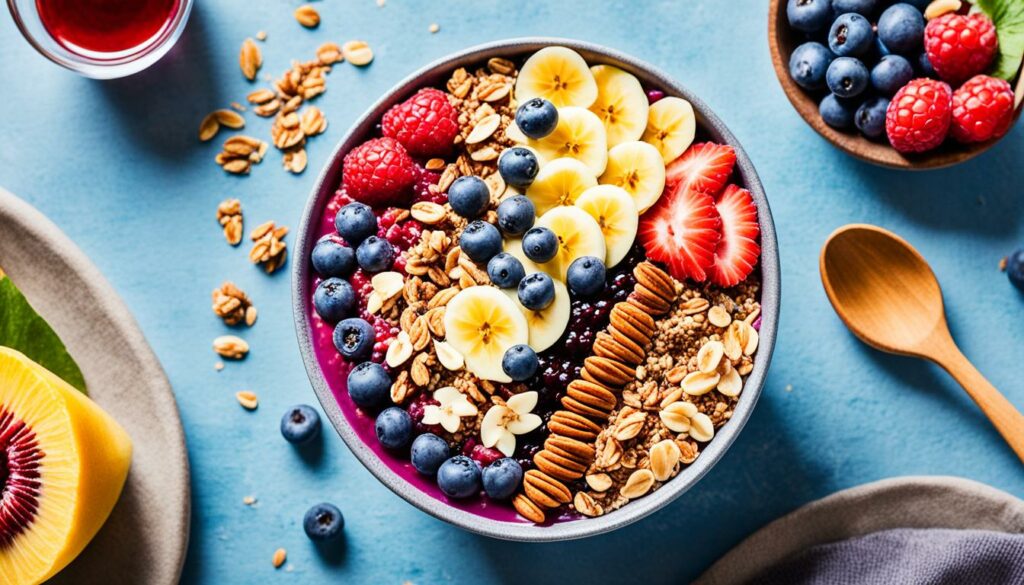
The Benefits of Acai and Why It's Gluten-Free
Acai is not only gluten-free but also offers a host of other benefits. Let’s explore why Acai is a fantastic addition to your diet:
- Acai Benefits: Acai berries are a nutrient powerhouse packed with fiber, amino acids, antioxidants, and healthy fatty acids like omega-3, omega-6, and omega-9. These nutrients improve digestion, increase energy levels, enhance immune function, and improve skin health.
- Vegan Acai: Acai is a vegan-friendly food, making it an excellent choice for individuals following a plant-based lifestyle. It provides essential nutrients in animal-based products, promoting overall health and well-being.
- Sustainable Acai: Acai is sourced sustainably, ensuring its cultivation and harvesting practices have minimal environmental impact. You can enjoy their benefits by choosing sustainable Acai products while supporting eco-friendly practices.
- Nutrient-Dense Acai: Acai is considered one of the most nutrient-dense fruits, offering a wide array of essential vitamins, minerals, and antioxidants. It’s a delicious way to meet your daily nutrient requirements and support your overall health.
- Organic Acai: Acai berries are certified organic and free from pesticides and harmful chemicals. Choosing organic Acai ensures that you’re consuming a pure and high-quality product.
Its delightful flavor profile features earthy and slightly tart notes so that Acai can be enjoyed in various recipes and smoothies. Its gluten-free nature and incredible benefits make it a versatile and nutritious choice for anyone seeking a healthy lifestyle.
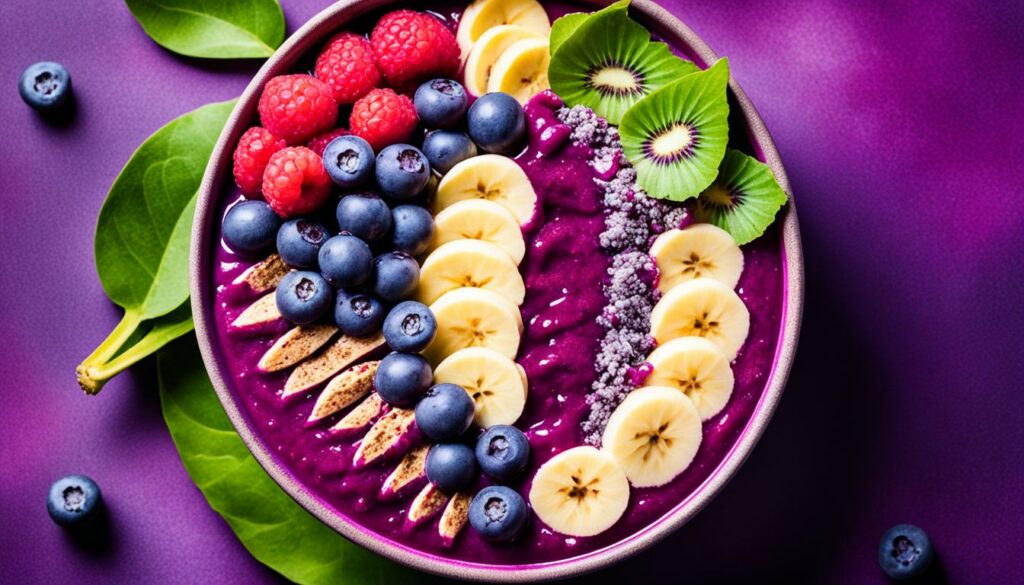
Gluten-Free Acai Recipes and Treats
If you’re looking for gluten-free and delicious ways to enjoy Acai, you’re in luck! Numerous gluten-free Acai recipes and treats will tantalize your taste buds. Acai has got you covered whether you’re craving a hearty meal or a refreshing snack.
Acai Bowl Recipes
Acai bowls are a popular choice among Acai enthusiasts. These customizable bowls allow you to create your culinary masterpiece by adding your favorite toppings. Start with a base of frozen Acai puree blended with berries and a liquid of your choice, such as almond milk or coconut water. Then, get creative with toppings like gluten-free granola, fresh fruits, nuts, seeds, and coconut flakes. The endless possibilities result in a delicious and nutritious meal that satisfies your cravings.
Acai Smoothie Recipes
Acai smoothies are the way to go if you’re in the mood for a refreshing and healthy drink. Blend frozen Acai puree with your favorite fruits like bananas, berries, or mangoes, and add a liquid of your choice for consistency. Consider adding protein powder, nut butter, or spinach to enhance the flavor and boost the nutritional value. The result is a creamy, antioxidant-packed smoothie that will energize and satisfy you.
Acai Treat Recipes
Indulge your sweet tooth with gluten-free Acai treats. From heavenly Acai pies to decadent chocolate-covered bananas, these treats are a delightful way to satisfy your cravings. Whip up an Acai pie by combining Acai puree with a gluten-free crust and baking it perfectly. Dip fresh bananas into melted chocolate and sprinkle them with crushed nuts or coconut flakes for a quick and easy treat. These gluten-free Acai treats are delicious and packed with the goodness of Acai berries.
Below is a table summarizing the key ingredients and instructions for these gluten-free Acai recipes:
| Recipe | Key Ingredients | Instructions |
|---|---|---|
| Acai Bowl |
|
|
| Acai Smoothie |
|
|
| Acai Treat |
|
|
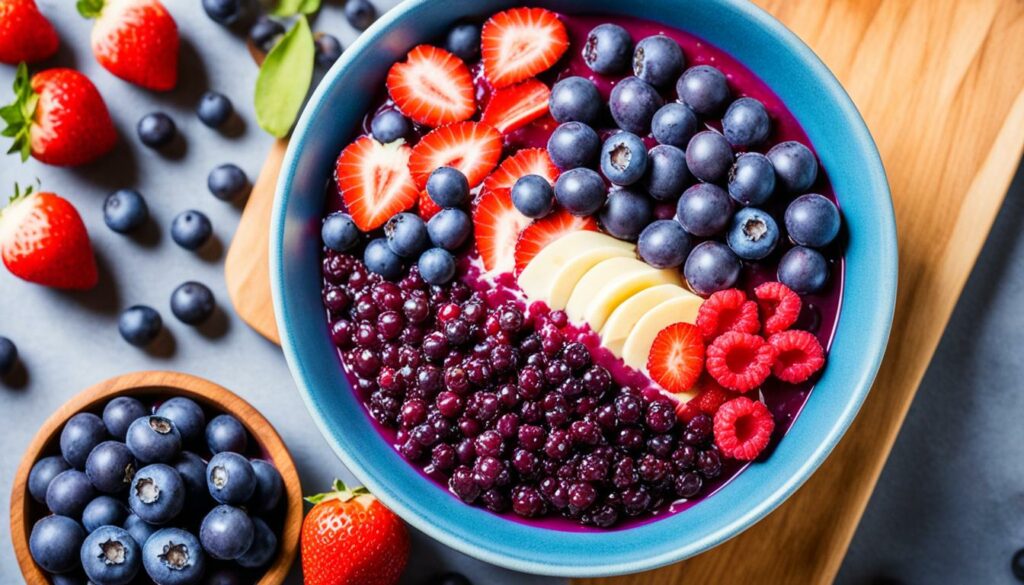
With these gluten-free Acai recipes and treats, you can satisfy your cravings while enjoying the numerous health benefits of Acai. Discover the versatility and deliciousness of Acai by incorporating it into your gluten-free diet. From wholesome Acai bowls to refreshing Acai smoothies and indulgent Acai treats, there’s a gluten-free Acai recipe for everyone.
Conclusion
In summary, Acai is an incredible gluten-free superfood that offers a wide array of health benefits and is exceptionally versatile for those following a gluten-free diet. The possibilities are endless, whether you opt for indulgent Acai bowls, refreshing Acai smoothies, or delectable Acai treats.
Acai’s natural gluten-free composition and its vegan, sustainable, and nutrient-dense characteristics make it the perfect choice for individuals seeking gluten-free alternatives. Its rich flavor profile, packed with earthy and slightly tart notes, will tantalize your taste buds while enhancing your overall well-being.
Experiment with various Acai recipes and treats to fully immerse yourself in the wonders of gluten-free Acai living. So why wait? Embrace the goodness of Acai today and witness the transformative impact it can have on your gluten-free lifestyle.

